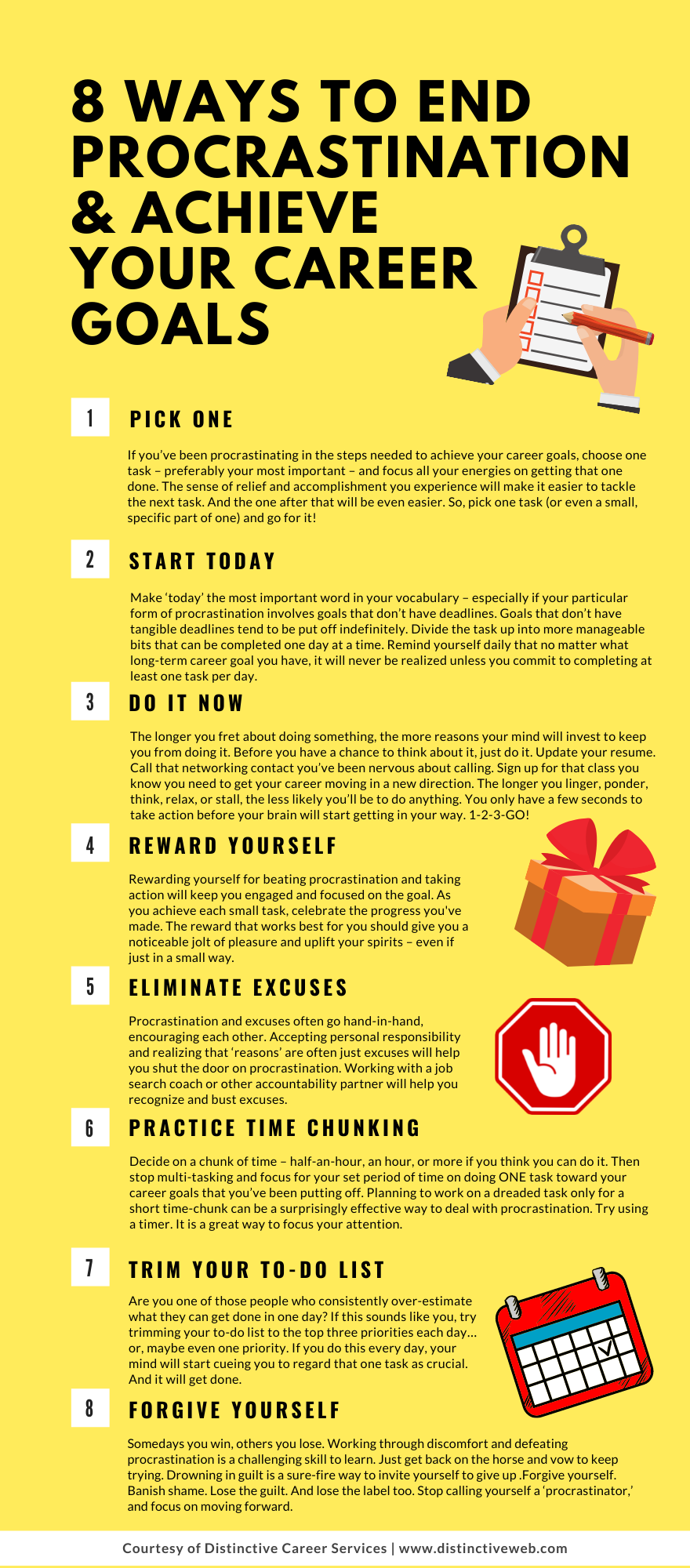
Consistent and persistent action. These are the keys to achieving your career goals. They are, in fact, the keys to achieving most goals.
It is easy to fall back on believing that success in achieving your career goals is a combination of who you know and being in the right place at the right time.
While these may play a role, the truth is that successfully achieving your career goals has much more to do with planning, prioritization, and consistent action toward your goals.
In other words, if you want to achieve your career goals, then you must be willing to put in the work on a regular basis.
Progress Through Action
You might not always see immediate results when you take consistent action, but if you stay focused on taking small steps every day, then eventually, those steps will add up and lead to the desired outcome.
Here are some more key benefits of staying consistent in the pursuit of your career goals:
1) You Will Make Connections
By taking consistent action toward your career goals, you will have more opportunities to meet people who can help you get where you want to go. When networking or interviewing for jobs, having connections can make a huge difference in getting hired or making a positive impression on potential employers. Making connections also increases the chances that someone might refer you for positions that they come across.
2) You Will Become More Confident
As you take consistent action to achieve your career goals, it’s likely that some things won’t go as planned or as expected. This is inevitable when striving for something big, but it doesn’t mean failure; instead, use these moments as learning experiences and build up your confidence by seeing each setback as an opportunity to grow.
3) You Will Feel More Motivated
Taking consistent action towards a goal keeps motivation levels high because it allows for progress tracking, which can be rewarding both mentally and emotionally when goals start being met or exceeded!
It’s also easier to stay motivated when you have a plan of consistent action as opposed to one large burst of effort followed by nothing else. Forward progress toward your goals keeps energy levels up because there is always something new happening which means less time spent feeling stagnant or unmotivated.
But Why Is It So Hard to Take Action Consistently?
Whether you’re looking for a new career path or climbing the corporate career ladder, achieving your career goals is no easy task. It takes focus, dedication, and persistent action to make progress on any professional goals worth pursuing.
It is that “consistent action” bit that trips most people up. In most cases, we know what we need to do. We just don’t want to do it.
The problem is that when it comes to your career and achieving career goals – whether that goal is to land a new job, win a desired promotion, start your own business, make a complete career change, or something else—the actions required for us to get there are things we don’t really want to do.
So, we procrastinate.
We put those tasks off. There is always tomorrow, we tell ourselves.
But tomorrow turns into next week, next month, next year…and suddenly, we realize we are no closer to achieving our professional development goals.
Procrastination is the greatest barrier to achieving your career goals. It is the root of almost all unachieved career aspirations and stalled career advancement.
Procrastination is something we all experience. Trouble is that procrastinating can quickly become a habit; one that can derail your career dreams.
If you can defeat your procrastination and take action consistently and persistently, you can achieve your career goals.
Here then, are 17 important steps to achieving your career goals this year.
Important Steps to Achieve Your Career Goals
1. Pick One
If you’ve been procrastinating in the steps needed to achieve your career goals, choose one task – preferably your most important – and focus all your energies on getting that one done. The sense of relief and accomplishment you experience will make it easier to tackle the next task. And the one after that will be even easier. So, pick one task (or even a small, specific part of one) and go for it!
2. Start Today
Make ‘today’ the most important word in your vocabulary – especially if your particular form of procrastination involves either short-term career goals or long-term career goals that don’t have deadlines.
Goals that don’t have tangible deadlines tend to be put off indefinitely. Divide the task into more manageable bits that can be completed one day at a time.
Remind yourself daily that no matter what long-term career goals you have, they will never be realized unless you commit to completing at least one task per day.
3. Do It Now
The longer you fret about doing something, the more reasons your mind will invest to keep you from doing it. Before you have a chance to think about it, just do it.
- Update your resume.
- Call that networking contact you’ve been nervous about calling.
- Ask a friend or family member to help you practice your interviewing skills in a mock job interview.
- Sign up for that class you know you need to strengthen your professional development and get your career moving in a new direction.
- Schedule two informational interviews for next week.
The longer you linger, ponder, think, relax, or stall, the less likely you’ll be to do anything.
You only have a few seconds to take action before your brain will start getting in your way.
1-2-3-GO!
4. Reward Yourself
Rewarding yourself for reaching career milestones is an important part of achieving success.
Taking the time to stop and reflect on your accomplishments can help you stay motivated and energized as you focus on your long-term career goals.
The rewards don’t have to be extravagant; they can be something small like a night out with friends, a day at the spa, or even taking a few hours to relax and watch some TV.
The key is to make sure that you are actively acknowledging the progress that you make in order to stay on track. Celebrating successes can ensure that you stay focused and motivated during tough times, so don’t forget to reward yourself for all of your hard work!
5. Eliminate Excuses
Procrastination and excuses often go hand-in-hand, encouraging each other. Accepting personal responsibility and realizing that ‘reasons’ are often just excuses will help you shut the door to procrastination.
Working with a job search coach or another accountability partner will help you recognize and bust excuses and step outside your comfort zone.
6. Renew Your Commitment Daily
To stay on track on the path toward long-term goals, it’s important to maintain a commitment to the career goal. This can be achieved by renewing your commitment each day.
When you wake up, remind yourself of your ultimate career goal. Think about what success means to you. What would be the ultimate positive impact of achieving your professional development goals? How would it benefit your professional life?
The feeling of excitement about achieving the desired career goal is constantly alive. You just need to reengage it regularly.
7. Practice Positive Self-Talk
Negative thoughts and procrastination on your professional goals go together. Start reframing self-deprecating, blame-filled thoughts into empowering, positive ones.
If a negative thought creeps into mind, write it down, reflect on why it popped up, and work to reframe it in a positive way.
If your self-talk becomes positive, you will start to believe it. And after a while, as you experience the joys of successful habits, you will find yourself less inclined to procrastinate and more inclined to take consistent daily action.
8. Practice Time Chunking
Hone your time management skills.
Decide on a chunk of time – half an hour, an hour, or more if you think you can do it. Then stop multi-tasking and focus for your set period of time on doing ONE task toward your career goals that you’ve been putting off.
Planning to work on a dreaded task only for a short time-chunk can be a surprisingly effective way to deal with procrastination. Try using a timer. It is a great way to focus your attention.
9. Set Realistic Goals
Setting career goals is an important part of developing a successful career path. That’s why it’s essential to make sure these career goals are realistic, actionable, and attainable.
If you set unrealistic goals, it’s easy to get discouraged.
Realistic career goals should be mapped out based on both your short-term and long-term career plans.
A good example of a short-term career goal could be applying for an internal job transfer within the next six months in order to gain more exposure in different departments.
Other short-term career goals examples might include attending networking events in your field to make important connections or building out your LinkedIn profile so that you showcase your skills more effectively when applying for jobs.
On the other hand, a realistic long-term career goal may include completing a professional certification program, winning a coveted promotion to a leadership role, or starting your own business within five years.
Regardless of the career goals you set, the key is to create achievable objectives that will allow you to progress in your career with tangible results.
Avoid discouragement by setting goals and milestones that are attainable. Use the SMART goal-setting technique. Your confidence and motivation soar when you know you can achieve what you set out to accomplish.
10. Plan Your Week
Set aside time on your calendar to work on your career goals. Make an appointment with yourself and keep it!
It doesn’t have to be the most meticulous plan in the universe. But do spend 30 minutes every Sunday night planning your week ahead, scheduling time for working toward achieving your career goals.
11. Change Your Mindset
It’s important to keep an open mind and a growth mindset when embarking on any career goals. This means being flexible in how you think of yourself and the possibilities available – instead of putting up barriers.
When you feel bad about a task, consciously shift your mindset and get excited that you’re being given an opportunity to work toward your career goals. The least successful people are the worst procrastinators. Successful people do the hard things.
Changing your mindset can make all the difference when job searching and pushing towards career goals. Having a positive outlook on things can help you stay focused even during those times of struggle. Remember: there are no failures. Only opportunities to learn and grow. Did you stumble over an interview question at a recent job interview? Don’t beat yourself up over it. Instead, use it as an opportunity to hone your interviewing skills.
Let go of past defeats and focus on the present by creating attainable career goals and taking small steps toward them each day. For example, map out a plan that includes networking opportunities, relevant courses or career certifications, and researching different career paths that fit your skill set. Ultimately, having a positive mindset will help you stay productive as you work on achieving your career goals.
12. Prioritize
Does it feel like everything on your to-do list is equally important?
When working toward career goals, it can be overwhelming to maintain a long to-do list with all the tasks that need to get done.
The key to managing this list is to prioritize each task based on how it will contribute to achieving your goals. Break down your career or job goals into smaller steps and give each one an estimated timeline for completion.
From there, focus on completing each task according to its deadline and put more of your energy and resources into the most important tasks first.
You can also make “short list” of quick tasks that might not be as important but still need to get done in order to help you advance toward your career goals.
This approach helps keep you organized, as well as motivated, and focused on what needs to be accomplished next in order for you to reach your career objectives.
13. Trim Your To-Do List
Are you one of those people who consistently overestimate what they can get done in one day? If this sounds like you, try trimming your to-do list to the top three priorities each day…or, maybe even one priority. If you do this every day, your mind will start cueing you to regard that one task as crucial. And it will get done.
14. Forgive Yourself
Some days you win, others you lose. Working through discomfort and defeating procrastination is a challenging skill to learn. Just get back on the horse and vow to keep trying. Drowning in guilt is a surefire way to invite yourself to give up. Forgive yourself. Banish shame. Lose the guilt. And lose the label too. Stop calling yourself a ‘procrastinator,’ and focus on moving forward.
15. Join a Job Search Group
Joining a job search group can be a great way to reach career goals and stay motivated during a career transition.
Not only will you have access to the collective knowledge and experience of the group, but you’ll also have mentorship opportunities, career advice, new connections, and emotional support from those in similar career situations.
With helpful guidance and dedicated networking, you can use this group as an invaluable resource to help keep your career dreams on track. By participating in the job search group, you’re giving yourself an incredible chance to build professional contacts that can help you not just in achieving professional career goals but also in achieving personal development goals.
16. Banish Burn Out
People often procrastinate when they are feeling burned out by their work and their life. Identify what is making you feel burned out and take steps to free yourself from that feeling. For example, stop working weekends and late nights, delegate tasks that others can do, and make sure you are spending fun time to recharge your motivation.
17. Forget About Being Perfect
People who are perfectionists are prone to putting things off. They become overwhelmed with the fear that they won’t achieve their career goals. Perfectionism just reduces efficiency and induces paralysis.
It’s important to realize that getting things done is more important than doing everything perfectly: Working on your career stories, attending that networking meeting, practicing interview skills – these are what to focus on. If perfectionism is your problem, give yourself permission to let go a little and get it done.
Get Started on Your Career Goals Today!
So there you have it—17 steps that you can take to achieve your career aspirations this year.
Consistently and persistently taking small steps adds up over time and will propel you toward success.
It’s also important to remember that setbacks do not mean failure; they simply mean that adjustments must be made in order to get back on track. Reaching your career goals can be challenging, but by having a clear plan of action and a supportive network, anything is possible. After all, those who are successful are not necessarily smarter or luckier; they just never give up.
Do you want help reaching your career goals? Don’t go at it alone! If you’re ready to make significant progress, then book an informational call today and learn how our resume writing and job search services can be of help to you!
All the best in reaching your career goals this year!










